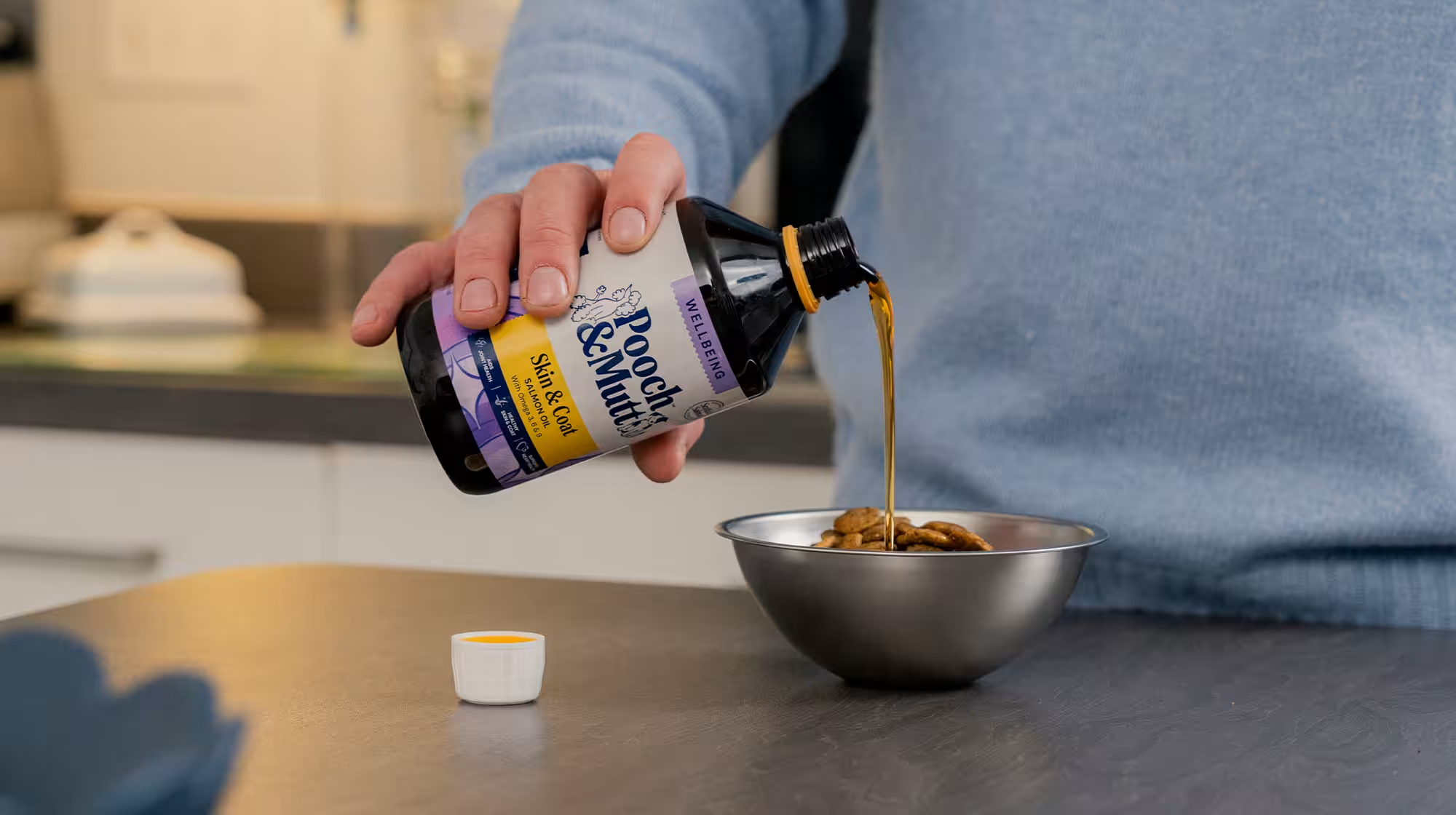Key Takeaways:
- Common conventional anti-inflammatory treatments for dogs include Non-Steroidal Anti-Inflammatory Drugs (NSAIDs), steroids and Antihistamines.
- Common natural anti-inflammatory treatments for dogs include Turmeric and Golden Paste, Oily fish, Pineapple, Ginger, Blueberries, Broccoli and Boswellia Serrata.
- Beneficial anti-inflammatory supplements include Omega-3 fatty acids, Collagen, Devil's Claw, Yucca, Vitamins E and C and CBD oil.
If your dog suffers from inflammation anywhere in their body, whether it's a sensitive tum, osteoarthritis or just general aches and pains, you’ll know that it can be a challenge keeping their physical and mental wellbeing in tip-top shape.
In this guide, we’ll go over the types of inflammation in dogs, what to look out for, and the various ways in which these conditions can be treated - from conventional medication to alternative remedies and supplements.
With our simple guide to anti-inflammatory treatments for dogs, you’ll have the full knowledge in deciding what’s best for you and your pooch.
What are conventional anti-inflammatory treatments for dogs?
If your pooch suffers from inflammation of some kind, it’s likely their vet will prescribe one or more of the following conventional treatments:
Non-Steroidal Anti-Inflammatory Drugs (NSAIDs)
NSAIDs, which stands for Non-Steroidal Anti-Inflammatory Drugs, tend to be the ‘go-to’ treatment for a dog who has inflammation.
They come in various forms; the most common types in the UK are Carprofen (Rimadyl) or Meloxican (Metacam) , but there are many other types you may be prescribed first depending on your dog’s specific issues.
Benefits and side effects of NSAIDs
NSAIDs main purpose is in reducing inflammation and the negative side effects of inflammation.
Without getting too scientific, they work by inhibiting the enzymes which produce a substance called prostaglandins, which are responsible for pain, fever and inflammation in the body.
By inhibiting these enzymes, negative symptoms of inflammation such as itching, redness, swelling and pain are reduced, and they feel some physical relief.
Over-the-counter availability and usage
It’s really important that NSAIDs are prescribed by a vet, not bought over the counter.
Your vet can recommend how often your pooch should take the medication and whether it should be short-term or long-term, as it depends on their health condition and whether they’re receiving any other regular treatment.
Combining NSAIDs with other medications
It’s quite common to combine NSAIDs with other treatments, but only on the advice of your vet.
Speak to them about all the medication your pooch is taking, and inform them before using any over-the-counter treatment, as NSAIDs may be less effective if combined with certain meds.
Steroids
Your vet may also prescribe steroids to treat your dog’s inflammation. They’re often used for skin conditions, allergies, autoimmune diseases or osteoarthritis, as well as other infections of the body.
Uses, benefits, and side effects of steroids
Steroids release anti-inflammatory agents, and work powerfully to reduce inflammation and its symptoms.
This is especially useful if a dog’s body is overproducing an immune response, as it can suppress that response and stabilise it to a more comfortable, manageable level. Their use must be carefully monitored, though - as overuse or misuse of steroids can have side effects.
Steroids can cause an increased susceptibility to infections, metabolic changes which can lead to weight gain, and gastrointestinal issues.

Combining steroids with other medications
Always check with your vet whether prescribing steroids to your dog will interact with other medications they may be on. Your vet will have full knowledge of your dog’s health condition and which medications can be used together.
Antihistamines
Antihistamines are mostly used to combat inflammation caused by allergic reactions, as histamines are the substances released by the body during allergic responses.
Uses, benefits, and side effects of antihistamines
Antihistamines for dogs are used to combat the nasty symptoms of allergic reactions, and as part of that, they have mild anti-inflammatory properties.
As allergies can manifest as itching, swelling, redness and rashes, antihistamines work to lessen these symptoms, and also reduce some inflammation in a dog’s body.
Antihistamines aren’t really powerful enough to combat severe inflammation. For more chronic health conditions, stronger medication such as NSAIDs or steroids are usually prescribed.
Combining antihistamines with other medications
Combining antihistamines with stronger meds, such as steroids, is quite a common practice - but should always be done on a vet’s advice. Be sure to chat thoroughly about your dog’s treatment plan and what medication should and shouldn’t be combined.

What are the risks of conventional anti-inflammatory medications for dogs?
There are always risks associated with conventional medication - your pooch might have an adverse reaction to treatment, a combination of meds might interact negatively and cause side effects, or you might worry that your dog becomes dependent on medication.
In some cases, dogs on anti-inflammatory medication develop suppressed immunity, an increase in blood pressure or in severe cases, liver or kidney complications. Some dog owners decide to try natural remedies, in the hopes that changing diet and environment may have some impact.
What are natural anti-inflammatory alternatives for dogs?
There are a host of natural remedies for inflammation in dogs that could be used either in combination with conventional treatments or as an alternative treatment. Let’s go into the most common natural remedies for inflammation in dogs…
Natural anti-inflammatory foods for dogs
Some foods in the natural world are known for their anti-inflammatory properties - turmeric being one of them. The yellow spice is quite a powerful ingredient, so must be administered to dogs in the correct way so as not to cause any digestive issues.
Turmeric and Golden Paste
Turmeric has been used in ancient medicines for thousands of years as it contains curcumin, an antioxidant known to reduce inflammation in the body.
It’s important to use the right amount of turmeric, to avoid your pooch having any digestive problems. The amount depends on your dog’s size, but the recommended dosage is typically 1/8 to 1/4 teaspoon per 10 pounds of a dog’s body weight.
To make an edible turmeric mix, called ‘Golden Paste’, simply simmer some turmeric with water and olive oil in a pan. Some pooch parents also add a dash of black pepper, so that the turmeric is absorbed into the body easily. You can then add it to a dog’s regular food.
 Nutrition
Nutrition
Other beneficial foods and herbs
The plant world is full of natural anti-inflammatories. Other foods and herbs known for their anti-inflammatory effects in dogs include the following:
Oily fish such as salmon or mackerel, due to their omega-3 fatty acids.
Pineapple, for its anti-inflammatory enzyme, bromelain.
Ginger, for gingerol, its anti-inflammatory component. It’s often recommended to reduce turbulence in the gut.
Blueberries which contain numerous antioxidants that fight inflammation.
Broccoli for its antioxidants such as sulforaphane, alongside vitamins which have anti-inflammatory properties.
Boswellia serrata, derived from a tree, has been used in African medicine for many years to reduce inflammation.

What's a good anti-inflammatory diet for dogs?
Foods that reduce inflammation are beneficial to all dogs, no matter their health condition, as a healthy, well-balanced diet can act to prevent the onset of inflammatory diseases.
Foods that have anti-inflammatory properties also tend to contain a host of other nutrients and health benefits.
How to implement a natural anti-inflammatory diet for dogs
If you want to focus on implementing anti-inflammatory foods into your dog’s diet, do so gradually - don’t just add all new foods into their dog bowls one day, as they’re sure to get a tummy upset!
Perhaps chat to your vet about which foods may be of particular benefit, introduce the food gradually alongside your dog’s regular food, and be sure to phase out foods which contribute to inflammation.
What food should you avoid for dogs with inflammation?
There’s a vital step in creating an anti-inflammatory diet for your dog, and that’s to phase out foods that will trigger inflammation.
These foods include:
Foods high in saturated fat, salt or sugar. This usually includes ‘naughty’ dog treats, cheap dog food or too many human table scraps.
Processed foods that don’t contain whole ingredients and are full of artificial flavourings and preservatives.
Foods with a high grain or gluten content can cause inflammation in some dogs due to an intolerance or allergy to grain or gluten.
Dairy products such as cheese or milk can cause inflammation due to their high fat content or lactose intolerance.
Any food that triggers allergic reactions. Of course, your dog could be allergic to any food, even a popular protein for dogs such as chicken. If your pooch has a food allergy, definitely avoid these foods.
What are supplements and therapies for inflammation in dogs?
Supplements for dogs are an extra superpower in your inflammation-fighting arsenal. Nutrient-packed supplements can be given in the form of food, or they can be bought as oils, powders or tablets to add to regular meals, almost like a condensed shot of anti-inflammatory power.
What are common supplements for inflammation in dogs?
Let’s take a look at the most well-known supplements to reduce inflammation in dogs:
Glucosamine and Chondroitin
Glucosamine and Chondroitin are often championed when it comes to reducing inflammation, particularly in joints - as they are a veritable power duo derived from the natural world.
Found in shellfish such as green-lipped mussels, glucosamine helps form the building blocks of cartilage, and in doing so, reduces the need for a pooch’s body to try to ‘heal’ the joint with inflammation.
Glucosamine supplements for dogs are often used to combat the symptoms of arthritis and joint pain.


Joint Tablets For Dogs
A vet-recommended, natural joint supplement for dogs, to support movement, and healthier joints and cartilage.
-
2 tablet sizes for small & larger dogs
-
For joint support and prevention
-
High-strength formula
-
Glucosamine & Chondroitin
Current price: £14.99
Joint Tablets For Dogs
Omega-3 Fatty Acids
Essential fatty acids, such as Omega-3, are hugely beneficial to a dog’s body as they contribute to building healthy cells.
Omega-3 Fatty Acids can boost a dog’s immunity, improve skin and coat condition, contribute to heart health, brain function and a dog’s nervous system, and reduce inflammation.
Omega-3 fatty acids can be found in oily fish; fish oil for dogs in supplement form can be drizzled over food each day.


Salmon Oil For Dogs
Daily Salmon Oil for dogs and puppies, rich in omega-3, 6 & 9 to support skin & coat health, joints, and overall vitality.
-
Omega rich
-
Puppy-friendly
-
99% Scottish Salmon
Current price: £11.49
Salmon Oil For Dogs
Other beneficial supplements
Other beneficial supplements for inflammation in dogs include:
Collagen, derived from animal skin and bones, is seen as a protective booster to joints.
Devil’s Claw, used in African medicine for many years, has anti-inflammatory effects.
Yucca, derived from the yucca plant, has long-known medicinal properties.
Vitamins E and C offer anti-inflammation as a secondary effect.
CBD oil. Though not confirmed by veterinary boards as a legitimate dog supplement, some dog owners add a few drops of CBD oil to their dog’s food for its soothing, pain relieving effects.
What are alternative therapies for inflammation in dogs?
Inflammation often causes physical effects in dogs, such as pain in the joints and effects on mobility. To ensure their dog is getting all the benefits of different treatments, lots of pooch parents opt for alternative therapies, such as physiotherapy or even acupuncture.
Physiotherapy
A physio can help stretch your dog’s body to reduce pain in their limbs or joints, promote good digestion, massage aching areas and boost their overall mood. They can also educate you in beneficial exercises for your dog.
Hot and cold therapies
Hot and cold therapies could include ice packs or heat packs, or immersing your pooch in a warm or cold bath to stimulate the areas of inflammation and reduce pain. You should always get a vet’s advice over how to do this properly, so that it acts to soothe your dog rather than panic or distress them.
Hydrotherapy
Low impact exercise, like taking a dog to swimming classes, or having them use an underwater treadmill, can ensure they’re getting all the benefits of exercise without putting too much stress on the areas in which they might feel pain. Done well, it can be fun for a dog, especially if they often seem frustrated at their limited movement.
Acupuncture
It may seem daunting to some pooch parents, but acupuncture is one alternative option to beat inflammation in your dog. Very thin needles are inserted into specific zones of a dog’s body, known as ‘trigger points’, which has been seen to relieve a dog’s pressure and pain.
What are the best practices in administering anti-inflammatories to dogs?
Always remember that anti-inflammatories, whether conventional medications or natural remedies, should be given to your pooch with a sense of caution.
Be especially careful if your dog is taking other medications already, and be mindful of your dog’s wellbeing and behaviour after they’ve tried a new food or supplement for inflammation.

When to consult a vet
Always chat to your vet before you try out a new treatment for your pooch, whether that be a prescribed medication, a natural remedy or alternative therapy - and stay in touch with them throughout the process of treating inflammation.
Be aware of how your dog responds to treatment, and if they display any adverse symptoms, such as increased skin irritation, pain, sickness, diarrhoea or other behavioural changes - and make sure to report back to your vet immediately.
At Pooch & Mutt we implement beneficial ingredients that reduce inflammation in all of our healthy, grain-free dog food. What’s more, our Salmon Oil for Dogs or our Joint Care Supplement for Dogs offer a safe, accessible way to give your beloved pooch a shot of anti-inflammatory nutrients.
FAQs
Can diet help with arthritis in dogs?
Osteoarthritis in dogs is sadly incurable, as it is a degenerative disease that wears down your dog’s joints over time.
What you can do, as a dog owner, is use a diet rich in anti-inflammatory foods and supplements to ease the symptoms of arthritis in your pooch and make getting around more comfortable for them.
If your pooch has yet to be diagnosed with arthritis, or if they’re not even showing any signs of sore or aching joints, you can absolutely put them on an anti-inflammatory diet as a preventative measure, to delay the onset of arthritis.
Is Ibuprofen safe for dogs?
No. Ibuprofen is a common remedy for pain relief for humans, but it absolutely shouldn’t be given to dogs.
Though ibuprofen is an NSAID (non-steroidal anti-inflammatory drug), and used to reduce inflammation in humans, even a small amount of ibuprofen can be toxic to dogs. It could lead to kidney, liver or heart damage, or even attack the central nervous system.
Talk to a vet to be prescribed an anti-inflammatory medication that is safe for dogs to use.
Is Benadryl a good anti-inflammatory for dogs?
Only if administered by a vet.
Benadryl is a common remedy for allergic reactions in humans, and it can be given to dogs in certain circumstances, but never by a dog owner without advice from a vet.
If your pooch is suffering from an allergic reaction, use medication prescribed to your specific dog or take them to a vet for a recommendation.





My cockapoo has recurrent ear infection. Vet has ruled out bacterial & suggests yeast infection. Dog has been on prescribed steroids for several weeks. He is constantly hungry, & thirsty. Pants especially at night, & has very disturbed sleep. On grain free food, no chicken. Is there an alternative natural anti inflammatory treatment? Thank you
Hi Annette, I'm sorry to hear about this. These are known and expected side effects of steroids. Thankfully, they're temporary and will stop once the medicine is finished. An alternative medicine option with fewer side effects would include Apoquel tablets, or a Cytopoint injection and it is always worth discussing alternatives with your vet. Ideally, we'd also determine what the dog is reacting to (food, environment or both) and limit/stop their exposure to this. If you would like any further advice at all, please do reach out to the team at pooch@poochandmutt.com :)
Hi, My patterjack Ozzy has suffered on and off with tummy issues for a few years, vets aren't very helpful and just want to run loads of expensive tests. We have changed his food numerous times due to his brother having skin allergies too, we are have been on an insect based food which seemed to agree with Ozzy more than other foods but has a tummy problem once a fortnight, he won't eat and his stomach makes some almighty noises, grumbling, High pitched squeels. Sometimes has a red slimy looking stool later that day. It doesn't affect his playful side and will go on walks. Mainly concerned over the noise his tummy makes. I think he has a sensitive tummy and an inflammatory would work but welcome any home remedies or natural products. Thanks.
Hi Charlotte, We are sorry to hear about this. It is important to work with your vet to determine the underlying cause, which could be many things including a food allergy, IBD, colitis, a chronic infection and so on. Usually we look into this with e.g. an intestinal blood profile, abdominal scan and/or gut biopsies. In the mean time, a hydrolysed diet such as our sensitivity dry food may be worthwhile., and also following an exclusion diet to help identify any triggers. Please do reach out to the team at pooch@poochandmutt.com if you would like any further and specific advice :)